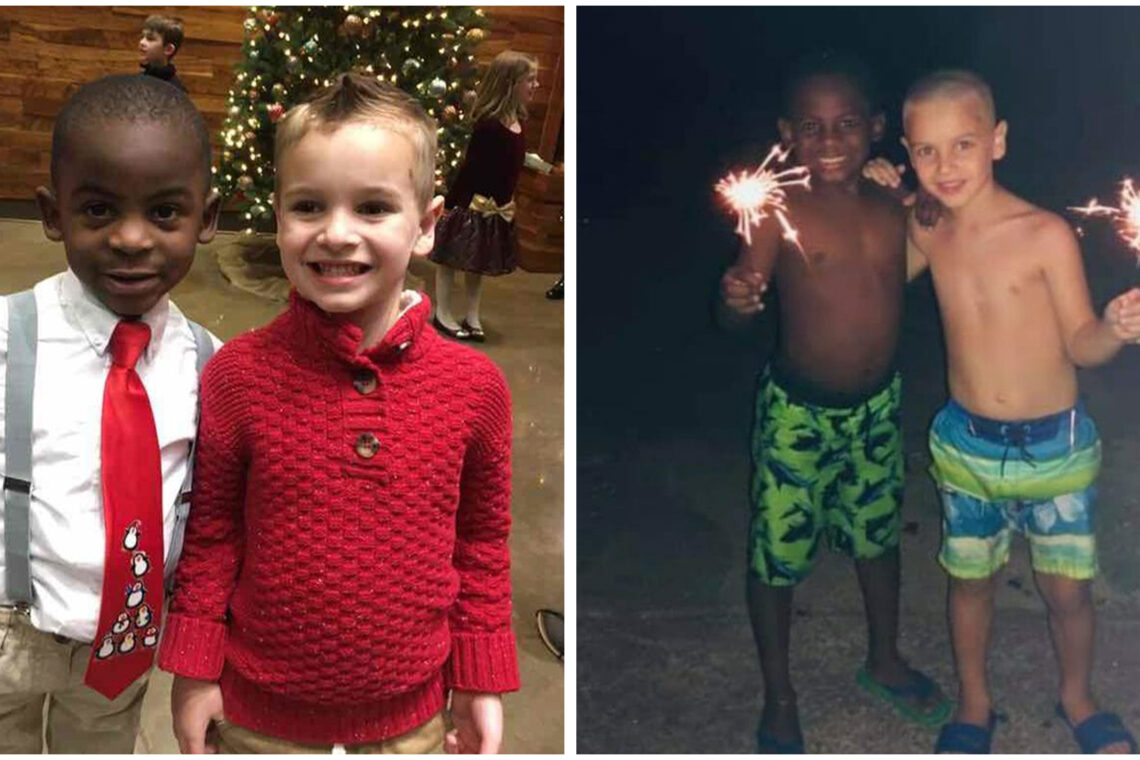
In a world where division often takes precedence over unity, the hearts of children remind us of the innate purity and openness that can exist in human relationships. Their perspectives are refreshing, especially when contrasted with the complex prejudices that sometimes manifest in adults. A compelling story illustrates this beautifully, revealing that the lessons we can learn from the youngest among us are both profound and enlightening.
This tale, shared by Lydia Stith Rosebush, captivated audiences when it first appeared online in 2017. The heartwarming narrative quickly garnered attention, resonating with many who recognized its deeper significance. The story centers around Lydia’s five-year-old son, Jax, and his best friend, Reddy. To Jax, there is no one more like him than Reddy; they share a bond that transcends superficial differences.

Jax, in his innocent view of the world, firmly believes that he and Reddy are identical twins. This perception stems from his simplistic understanding of friendship and likeness. The only distinction Jax recognizes between them is their hair—his own hair stands upright, while Reddy’s is neatly cropped. This small difference sparked a delightful idea in Jax’s mind: he decided to mimic Reddy’s hairstyle over the weekend as a playful prank to surprise their teacher on Monday morning. The logic was clear to Jax: if they looked the same, their teacher would have a difficult time telling them apart.
His mother, Lydia, shared Jax’s enthusiasm, noting how he couldn’t wait to showcase his new look at school. “Jax said he couldn’t wait to go to school on Monday with his hair like Reddy’s so that his teacher wouldn’t be able to tell them apart,” she wrote, expressing both pride and amusement at her son’s innocent mischief.
In her post, Lydia articulated a powerful reflection: “If this isn’t proof that hate and prejudice are something that is taught, I don’t know what is. The only difference Jax sees in the two of them is their hair.” This statement underscores a crucial truth—that biases are not inherent; they are learned behaviors often influenced by societal norms and experiences.
The story quickly resonated with countless others online, leading to a massive outpouring of support. Within a week, it received over 85,000 likes and 25,000 shares, igniting conversations about the unfiltered perspectives of children. Readers were inspired to share their own anecdotes illustrating similar themes of innocence and acceptance.
One notable contribution came from a school teacher in Germany, who recounted a conversation between a mother and her young son. The mother inquired about the number of refugees in her child’s class. The boy, however, offered a refreshing reply: “None, Mom. There are only kids in my class.” This interaction captures the essence of how children perceive their peers—not through the lens of nationality, background, or status, but simply as fellow children.

The heartwarming connection between Jax and Reddy continues to thrive even years after their story went viral. There’s no indication that they have drifted apart; rather, they seem to still share the strong bond of friendship that initially sparked Jax’s idea. Their enduring relationship serves as a testament to the purity of childhood friendships and the absence of prejudice that often accompanies them.
Reflecting on these stories, it becomes evident that society can learn valuable lessons from the younger generation. Children possess an innate ability to embrace diversity without the weight of preconceived notions. They are not yet burdened by the complexities of adult life, which can cloud judgment and foster divisiveness. Instead, they engage with the world with open hearts, seeing the commonalities that unite us rather than the differences that divide us.
As adults, we are often reminded of the importance of nurturing this perspective. Creating an environment where acceptance and kindness flourish is essential in shaping a more inclusive future. By observing how children interact and relate to one another, we can begin to dismantle the barriers that have been built over generations.
The story of Jax and Reddy serves as a poignant reminder that love and friendship can transcend any superficial differences. As we grow older, it’s vital to remember the simplicity of a child’s view—the idea that all we need to do is look past the surface and connect with one another on a deeper level. This lesson is crucial not only for our personal relationships but also for the broader society in which we live.
In conclusion, the tales of innocent friendships like that of Jax and Reddy shine a light on the possibility of a world where acceptance is the norm. By embracing the lessons learned from children, we can aspire to create a society free from prejudice and filled with understanding. The hearts of children are indeed devoid of hate, and as we strive to learn from them, we can work towards building a future characterized by love, acceptance, and unity. The purity of their friendship invites us all to reflect on our values and behaviors, ultimately urging us to cultivate a more compassionate world for generations to come.